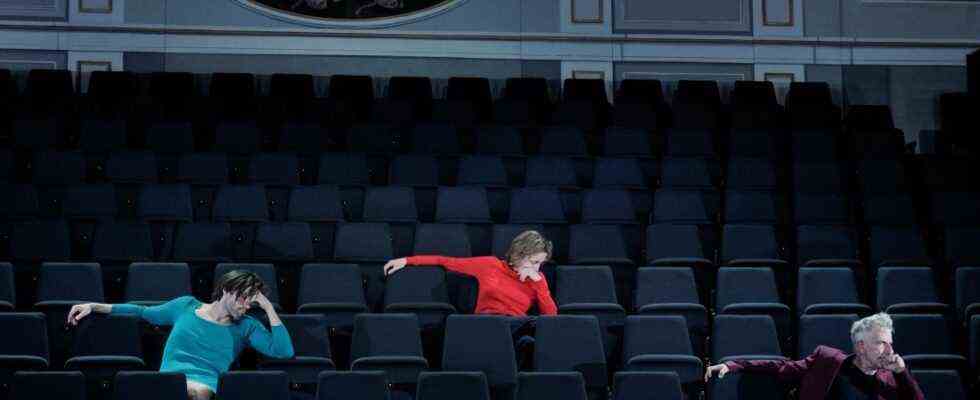The view from the window can open a world, even if it is only the view of the roofs of the big city on a cloudy November day. The nameless older man in Jon Fosse’s new piece “Strong Wind” doesn’t look outside, even if he looks ahead for so long. No world behind a thousand windows, at least no outside world. Instead, he gets lost in the kind of brooding that slowly makes the ground slip from under your feet: How many windows have I stood behind over the years, or haven’t I sat, and was that me at all, and what do I do in this one? Apartment, and is that actually my apartment.
In the case of an apartment, of course, one can also think of the place in the world and when looking through the window of the look through the eyes. So maybe we’re just in the lonely brooder’s head during this self-talk. And maybe his ex-wife and her young lover, who pop up in the apartment or in his head at some point, are just chimeras of this self-talk, at best memories or fantasies of the lonely man. Which, of course, would be a rather vain old man larmoyance dramaturgy: The ex-wife shrinks to the self-pity occasion of the abandoned, who somehow considers his loneliness to be particularly exquisite and profound.
The Norwegian author is an expert on agonizing self-talk
Or maybe it’s just honest, because we are in the world of the Norwegian poet Jon Fosse, an expert in torturous self-talk that digs deeper and deeper into the loneliness and perplexity of his characters. Many years ago, Fosse, a great silence and also a great drinker, said goodbye to drinking and then to the theater, maybe it was the other way around. So his new play is a kind of relapse, with play being a big word for this low-action meditation. Fosse honestly calls his almost 40-page text a “scenic poem”. Jossi Wieler, a close reader and a great master of the more subtle theater languages, has now staged the German premiere in the Kammerspiele of the Deutsches Theater Berlin.
The spectators sit in very close rows of chairs on the revolving stage of the DT-Kammerspiele (the maximum space utilization is decided in this theater in consideration of the hygiene and distance needs of pandemic-sensitive visitors). When the old-fashioned green curtain opens, Bernd Moss can work his way through Fosses variation of the “Who am I and if so how many” questions in the empty rows of chairs in the auditorium. His monologue does not go round energetically without comedy (“it changes and is always the same”), gleefully sticks to individual vocabulary (“moment – the ugliest word”) or discovers the riddles of passing time (“when you ‘now’ can say it’s already over “). That has something of deep-minded high-level stuff. When his ex-wife (Maren Eggert) and her lover (Max Simonischek, for the demonstration of virility in a neat three-day beard) appear relatively abruptly, they just seem like the continuation of this aimless prelude, so slightly unreal.
Both the helpless outbursts of the abandoned (“You can’t just move in with another man”) as well as the intimacy of the new couple, including the teasing swap of clothes, seem a bit tired and resigned, like a remake of passion and the echo of long-gone battles. Because it doesn’t fill the whole evening, not even a 70-minute evening, the last third of the performance saves itself in silliness when the ex-wife and her lover do gymnastics on a bright green climbing wall at the back of the stage and their half-naked bodies smear them with green paint (stage and costumes: Teresa Vergho). Presumably this outburst of involuntary comedy is supposed to be a portrayal of passion.

